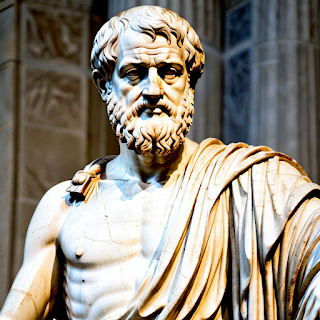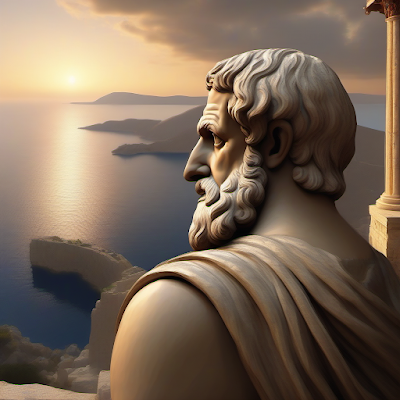"We are what we repeatedly do." - Aristotle.
"현재의 우리는 우리가 반복적으로 하는 행동의 결과이다." - 아리스토텔레스.

Aristotle: The Philosopher Who Shaped Western Thought
Aristotle, an ancient Greek philosopher and polymath, is widely regarded as one of the most influential figures in Western philosophy. His extensive works cover a broad range of subjects, including science, metaphysics, ethics, politics, and art. Aristotle's contributions have had a lasting impact on various fields of study and continue to be relevant today.
아리스토텔레스는 고대 그리스의 철학자이자 박식가로서 서양 철학에서 가장 영향력 있는 인물 중 한 명으로 널리 알려져 있습니다. 그의 광범위한 작품들은 과학, 형이상학, 윤리학, 정치학, 예술 등 다양한 주제를 다루고 있습니다. 아리스토텔레스의 공헌은 여러 학문 분야에 지속적인 영향을 미쳤으며 오늘날에도 여전히 중요합니다.
Early Life and Education
Aristotle was born in 384 BCE in Stagira, a city in northern Greece. His father, Nicomachus, served as the physician to the king of Macedonia. At the age of seventeen, Aristotle moved to Athens to study at Plato's Academy, where he remained for twenty years. During his time at the Academy, Aristotle developed his foundational ideas that would later challenge and expand upon Plato's teachings.
아리스토텔레스는 기원전 384년 북부 그리스의 스타게이라에서 태어났습니다. 그의 아버지 니코마쿠스는 마케도니아 왕의 주치의로 일했습니다. 17세에 아리스토텔레스는 아테네로 이주하여 플라톤의 아카데미에서 공부했으며 그곳에서 20년을 보냈습니다. 아카데미에서의 시간 동안 아리스토텔레스는 플라톤의 가르침에 도전하고 확장할 기초적인 아이디어를 발전시켰습니다.
Founding the Lyceum
After leaving Athens following Plato's death, Aristotle spent some time in various Greek cities and became the tutor of Alexander the Great in Macedonia. In 335 BCE, he returned to Athens and founded his own school, the Lyceum. Unlike Plato's Academy, which focused primarily on philosophy and mathematics, the Lyceum offered a diverse curriculum that included subjects like biology and history.
플라톤 사후 아테네를 떠난 후 아리스토텔레스는 여러 그리스 도시에서 시간을 보냈고 마케도니아에서는 알렉산더 대왕의 가정교사가 되었습니다. 기원전 335년 그는 아테네로 돌아와 자신의 학교인 리케이온을 설립했습니다. 철학과 수학에 주로 집중했던 플라톤의 아카데미와 달리 리케이온은 생물학과 역사와 같은 다양한 과목을 제공했습니다.

Philosophy and Contributions
Aristotle's philosophy is characterized by its empirical approach and logical rigor. He rejected Plato's theory of forms, arguing instead that the essence of objects resides within them rather than in some abstract realm. Aristotle believed that knowledge should be grounded in observation and experience.
아리스토텔레스의 철학은 경험적 접근과 논리적 엄격함으로 특징지어집니다. 그는 플라톤의 이데아론을 거부하고 대신 본질은 추상적인 영역이 아닌 사물 자체에 있다고 주장했습니다. 아리스토텔레스는 지식이 관찰과 경험에 기반해야 한다고 믿었습니다.
Logic and Syllogism
Aristotle is credited with founding the study of logic and developing the syllogism—a form of reasoning where conclusions are drawn from two given premises. This logical framework laid the groundwork for future scientific inquiry and philosophical debate.
아리스토텔레스는 논리학 연구를 창시하고 두 개의 주어진 전제로부터 결론을 도출하는 추론 형태인 삼단논법을 개발한 것으로 인정받고 있습니다. 이 논리적 틀은 미래의 과학적 탐구와 철학적 논쟁의 기초를 마련했습니다.
Ethics and Virtue
In ethics, Aristotle introduced the concept of virtue ethics, emphasizing character and virtue as central to moral philosophy. He proposed that happiness (eudaimonia) is achieved through living a life of virtue balanced between excess and deficiency—a concept known as the "golden mean."
윤리학에서 아리스토텔레스는 도덕 철학의 중심으로 성격과 덕을 강조하는 덕 윤리 개념을 도입했습니다. 그는 행복(유다이모니아)이 과잉과 결핍 사이에서 균형 잡힌 덕 있는 삶을 통해 달성된다고 제안했으며 이는 "황금 중용"으로 알려진 개념입니다.

Politics and Society
Aristotle's work Politics explores human behavior within societal contexts, advocating for a political system that enables citizens to achieve virtue and happiness. He analyzed various forms of government and emphasized the importance of a balanced constitution.
아리스토텔레스의 저서 정치학은 사회적 맥락에서 인간 행동을 탐구하며 시민들이 덕과 행복을 달성할 수 있도록 하는 정치 체제를 옹호합니다. 그는 다양한 형태의 정부를 분석하고 균형 잡힌 헌법의 중요성을 강조했습니다.
Legacy
Aristotle's influence extends far beyond his lifetime. His works were preserved by Islamic scholars during the Middle Ages and later reintroduced to Europe, profoundly shaping Western thought during the Renaissance and beyond. Today, Aristotle's ideas remain foundational in disciplines such as logic, ethics, political theory, and natural sciences.
아리스토텔레스의 영향력은 그의 생애를 훨씬 넘어섭니다. 그의 작품들은 중세 동안 이슬람 학자들에 의해 보존되었고 나중에 유럽에 재도입되어 르네상스 및 그 이후 서양 사상을 깊이 형성했습니다. 오늘날 아리스토텔레스의 아이디어는 논리학, 윤리학, 정치 이론 및 자연 과학과 같은 학문 분야에서 여전히 기초적입니다.
In conclusion, Aristotle's comprehensive approach to knowledge and his commitment to empirical observation have left an enduring legacy that continues to inspire scholars across various fields today.
결론적으로 아리스토텔레스의 포괄적인 지식 접근 방식과 경험적 관찰에 대한 그의 헌신은 오늘날 다양한 분야의 학자들에게 계속해서 영감을 주는 지속적인 유산을 남겼습니다
